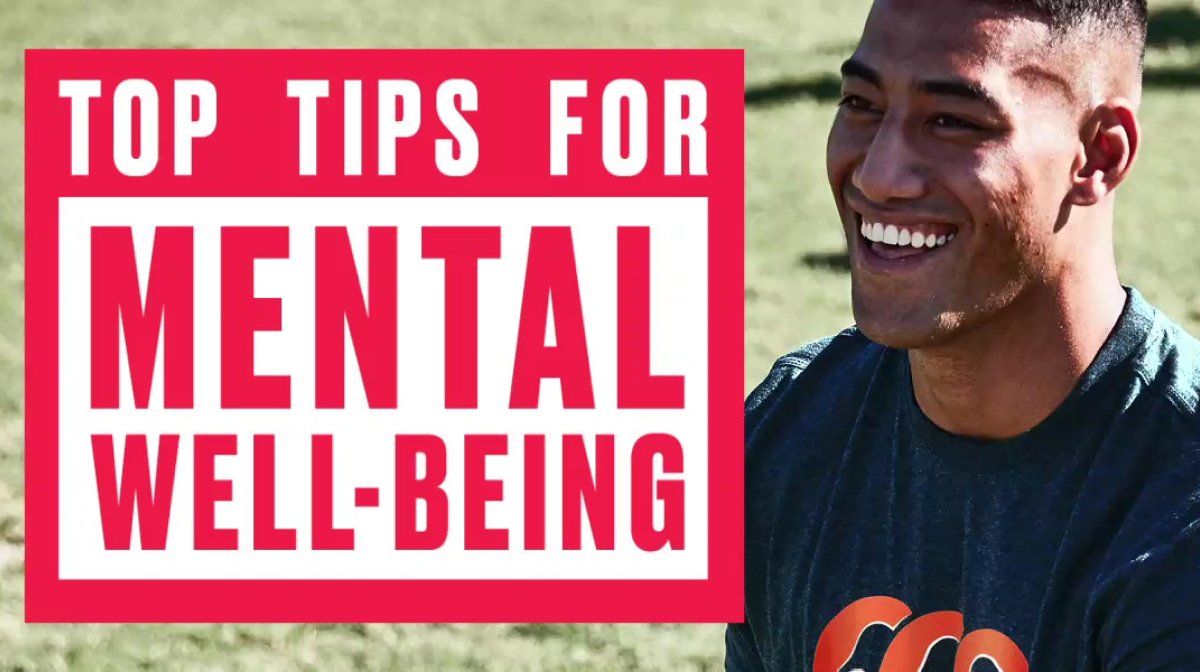
Some people plan to start a new home fitness routine, others are bracing themselves to tackle their kit bag from their last game. Both remarkable challenges of equal ambition, but as we adjust to this new way of life, it’s easy to be distracted and neglect one particular area: our emotional well-being. The truth is, long periods of working from home, social distancing and change in exercise or training routines all pose challenges to our mental well-being.
Focusing on these seven tips for mental wellbeing will help you to proactively tackle mental health challenges, while easing back into a new norm.
1. Community
We’re hardwired to need a community. Feeling lonely is entirely normal during social distancing. But loneliness isn’t about having no one else around – it’s about forming meaningful connections.
Schedule in socials: If you’re not already, arrange to meet up with friends, family, or teammates through video call, or use your fitness apps or games to connect with others.
Have a ‘check-in’ instead of just a ‘catch up’: Checking in is different. Focus on how you’re feeling. Make sure you’re sharing and listening too.
Share your experiences: We’re all going through this together. Open up about the challenges you are facing and how you’re tackling them, you could help others manage their own.
2. Keep calm
A global pandemic is certainly a stressful scenario. But dealing with this uncertainty in isolation, while keeping the wheels on our day to day, can lead to additional levels of stress and anxiety.
DON’T PANIC. Stress right now is entirely normal. Feeling it, has no reflection on your ability to do your job or stay focused.
Take out your headphones and turn off your screens. It’s important to stay informed, but a continuous stream of news isn’t always helpful.
- Get the facts right. Keep up to date with government and public health advice. Go to: WHO (World Health Organization) or local governments websites (UK).
There’s no right or wrong. Go out for a run, read a book, or watch the Lion’s tours back to back. Find what works best for you.
3. Staying positive
Big changes in our daily lives can kick off some serious mood swings. When up against challenges like financial pressures, work stress and relationship strains, it’s to be expected. We can all take proactive steps to avoid developing a continuous low mood or depression.
Get out to exercise and get some fresh air and your blood pumping.
Try not to be self-critical and accept you can’t be perfect.
If everything seems negative, hunt for the exceptions and focus on them.
Treat thoughts as thoughts and try to show them a clean pair of heels. Practice mindfulness and just be in the moment.
4. Show good form
If you’re working from home dealing with a new isolation dynamic, playing by the usual rules of the game can become a bit blurry.
Structure is essential. Speak to your family members or colleagues about setting clear goals. Agree who does what, or what work needs to be delivered. This will give everyone the headspace they need.
Design your day in advance, ideally remaining pretty close to how it was before COVID-19. Get up at a set time, have breakfast, use your would-be commute time to do a workout, listen to music, play Candy Crush (whatever works for you), and then tackle the day ahead.
Switch off at the end of the day. If you’re working, close your laptop lid, avoid looking at emails, and get the advantage over another evening of self-isolation.
5. Keeping healthy
It’s clear that the longer we’re sat indoors, the less exercise we’ll get. Physical and mental health are closely linked – just like the rest of our bodies, our brains depend on good blood flow and glucose metabolism to work properly. So, exercise is even more critical at the moment.
Try not to spend all day cooped up. Take a walk in the fresh air or go for a run around the park.
If you can’t get out, get your blood pumping indoor. There are plenty of exercise vids and classes available online from HIT to mindfulness meditations and yoga classes.
Eat your greens. Stack that plate with half fruit of veg to make sure you’re getting enough vitamins and minerals.
For those of you who track your biometrics, try not to get hooked on the drop in step count. Plan your day or week with plenty of exercise breaks. Quarantining will pass soon, and some form of more normal routine will kick in.
6. Sleep
A physically active day leaves you tired at the end of it. But while our days are less active, it can be harder to get quality sleep at night. However, missing out on that sleep can impact your ability to cope the increased pressures of the day, leaving you feeling more anxious.
Get outside during the day. Increased exposure to bright light helps your body, brain and hormones tell you when to be awake and when to sleep.
Try not to work in your bedroom. It can make you disassociate it with sleep. If this isn’t an option, avoid working from the bed itself if you can.
Avoid checking emails or using screens before bed. Bright light is good during the day, but not at night. Log off and help your brain unwind.
7. Fulfilment
During these unusual times, stay connected to your personal values, even use the rugby values if that helps. Put your energy in the right places. Be mindful that your game can too easily slip between overworking to keep the boss happy or losing your stride and becoming distracted.
Mindset is key: remember the big picture and that this will pass.
Stick to a routine.
Take a sense of achievement from all your goals and take meaning from small tasks.
Build your relationships and keep connected with video chats.
Accept that some relationships will need to you to adapt and flex.
Look out for others who might be vulnerable or lonely.









